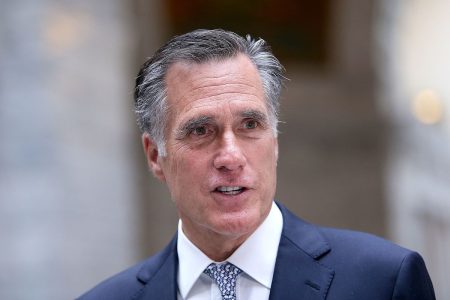I used to think Mitt Romney was a bully, and the way he was during the Obama debates was a travesty. But he has mellowed in his old age and now is considered one of the old school Republicans that are not part of the crazy train in DC, and rather someone you could vote for and somewhat depend on. Of course, there are those moments when he sat down with Trump looking for a job that come to mind that shows him pandering to Trump when he should have been out there talking against him. But still, one could, if one was an old school Republican, think that a vote for Romney, if you were so inclined, wouldn’t be such a bad thing. Boy how times have changed.
Story below:
Despite Donald Trump’s apparent inevitability, a baker’s dozen Republicans are hoping to become the party’s 2024 nominee for president. That is possible for any of them if the field narrows to a two-person race before Mr. Trump has the nomination sewn up. For that to happen, Republican megadonors and influencers—large and small—are going to have to do something they didn’t do in 2016: get candidates they support to agree to withdraw if and when their paths to the nomination are effectively closed. That decision day should be no later than, say, Feb. 26, the Monday following the contests in Iowa, New Hampshire, Nevada and South Carolina.
There are incentives for no-hope candidates to overstay their prospects. Coming in behind first place may grease another run in four years or have market value of its own: Mike Huckabee and Rick Santorum got paying gigs. And as former New Hampshire Gov. John H. Sununu has observed, “It is fun running for president if you know you cannot win.”
Candidates themselves used to consolidate the field to achieve what they saw as a greater purpose. In 1968, potential candidates William Scranton, Charles H. Percy, Mark Hatfield, John Chafee and Nelson Rockefeller rallied around my father, George W. Romney, instead of seeking nomination themselves, because they believed he had the best shot of stopping Richard Nixon. When my dad’s campaign faltered, he and they swung to Rockefeller to carry their cause forward. They were unsuccessful but not because of blind political ambition or vanity. They put a common cause above personal incentives.
Such narrowing of the field doesn’t happen today. The vast expansion of super PACs gives megadonors oversized influence on campaigns. A few billionaires have already committed tens of millions of dollars. They have a responsibility to give their funds with clear eyes about their candidate’s prospects. Donors who are backing someone with a slim chance of winning should seek a commitment from the candidate to drop out and endorse the person with the best chance of defeating Mr. Trump by Feb. 26.
Donors may think that party leaders can narrow the field. Not so. Candidates don’t listen to party officials, because voters don’t listen to them either. And the last people who would ever encourage a candidate to withdraw are the campaign staff and consultants who want to keep their jobs for as long as possible. They buck up candidates, promoting long-shot prospects and favorably biased internal polls. I can almost hear the words from “Dumb and Dumber”—“So you’re telling me there’s a chance?”
Our party and our country need a nominee with character, driven by something greater than revenge and ego, preferably from the next generation. Family, friends and campaign donors are the only people who can get a lost-cause candidate to exit the race. After Feb. 26, they should start doing just that.
Mr. Romney, a Republican, is a U.S. senator from Utah.
